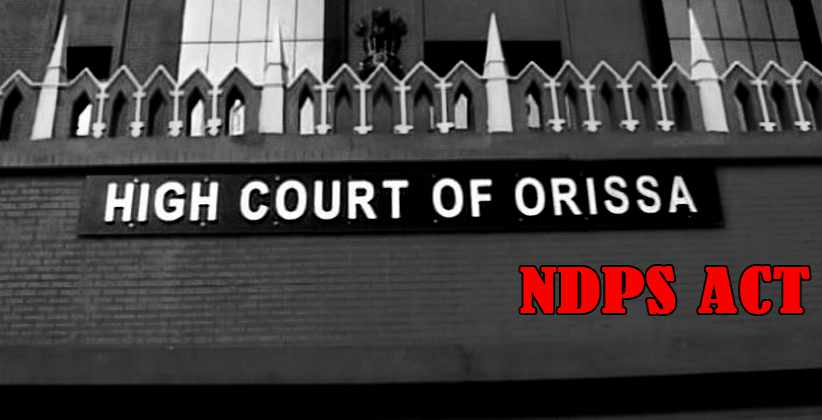The Orissa High Court in a landmark decision has stressed upon the filing of charge sheet against the accused held under the Narcotic Drugs and Psychotropic Substances (NDPS) Act, 1985 within stipulated 180 days. The accused were arrested under the NDPS Act for trading dreaded narcotics.
Justice S. K. Panigrahi observed this while hearing a bail plea in connection to a FIR lodged by Jaypore police after it seized 270 kg 200 grams of Ganja from a truck. Police had caught transporters red-handed. The accused persons were produced before the Sessions Judge-cum-Special Judge Koraput at Jaypore and they were sent to judicial custody on 15.04.2019. Moreover, an application for an extension of 60-days time to submit the charge sheet was sought by the prosecution to further investigate the ownership of the seized vehicle from the RTO. The same was granted after the lapse of the statutory period of 180 days i.e. after the stipulated period on 12.10.2019.
The High Court also observed that the special session court judge heard the submissions of the Special Public Prosecutor and proceeded ex- parte to extend the time to 30 days w.e.f. 13.10.2019 for submission of charge sheet without even issuing notice to the Accused persons as envisaged under Section 36A (4) of the NDPS Act. In this backdrop, one of the accused named Iswar Tiwari filed a bail petition before the Orissa High Court.
"The most poignant aspect of the case, however, is the non-issuance of notice to the accused at the stage of hearing the application for extension of time", said the single-judge bench of the High Court. Consequently, Justice Panigrahi held the non-service of a notice on the accused in violation of the most fundamental principle of natural justice i.e. Audi Alteram Partem which creates an indefeasible right to be released on bail to the Petitioner and allowed the bail petition. It has also suggested the lower court that it may alter the bail bond accordingly.
While appreciating the provisions empowering the Courts to authorize detention beyond 180 days as stipulated in the Act, for a period up to one year in the event of the pending investigation, the Single Bench Judge noted that that the law, however, mandates that the provisions shall be subject to certain conditions as following:
- Report of the Public Prosecutor indicating the progress of investigation must accompany the application for extension of time;
- Specific and compelling reasons for seeking detention of the accused beyond 180 days must be mentioned; a merely formal application will not pass muster
- A notice must mandatorily be issued to the accused and he must be produced in court whenever such an application is taken up;
- An application seeking an extension of time in the filing of charge sheet by the prosecution ought not to be kept pending and must be decided as expeditiously as possible and certainly before the expiry of the statutory period.
- In cases where any such default occurs, the question of it being contested doesn't arise and a right accrues in favor of the accused.
- The restrictions under Section 37 will have no application in such cases. It will have application only in the case of an application being decided on merits.
- Violation of any of the aforesaid would be construed as a "default" and the accused shall become entitled to be admitted to bail by such default.
- When an application under Section 167(2) Cr.P.C. r/w Section 36A(4) of the NDPS Act has been filed after expiry of the 180 days period and no decision thereupon, an indefeasible right to be released on bail accrued to the accused which cannot be defeated by keeping the said applications pending.
"In case there is a violation of any of the above, an indefeasible right to bail will be accrued to the accused", held Justice Panigrahi.
Further on, the court passed a direction to issue a notice to the accused and ruled that the accused, in the hearing of any such application for extension of time, must be produced in court.






